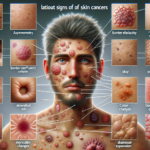Introduction to Colon Cancer
Colon cancer, also known as colorectal cancer, is a significant health concern worldwide. It ranks among the most common types of cancer and can affect individuals of various ages, although it is more prevalent in older adults. Understanding the symptoms of colon cancer is crucial for early detection and effective treatment. This article aims to shed light on the various symptoms associated with colon cancer, helping individuals recognize potential warning signs and seek medical advice promptly.
Common Symptoms of Colon Cancer
Colon cancer symptoms can vary widely among individuals, making it essential to be aware of the different signs that may indicate its presence. Some of the most common symptoms include:
- Persistent changes in bowel habits, such as diarrhea or constipation.
- Blood in the stool, which may appear bright red or dark.
- Abdominal discomfort, including cramps, gas, or pain.
- Unexplained weight loss.
- Fatigue and weakness.
These symptoms can often be mistaken for less severe gastrointestinal issues, which is why awareness and vigilance are key. If you experience any of these symptoms persistently, it is advisable to consult a healthcare professional for further evaluation.
Understanding the Risk Factors
Several risk factors can increase the likelihood of developing colon cancer. While some of these factors are beyond control, such as age and family history, others can be managed through lifestyle choices. Key risk factors include:
- A diet high in red or processed meats.
- Low fiber intake.
- Obesity and physical inactivity.
- Smoking and excessive alcohol consumption.
- A history of inflammatory bowel disease.
By understanding and addressing these risk factors, individuals can take proactive steps to reduce their risk of developing colon cancer.
The Importance of Early Detection
Early detection of colon cancer significantly increases the chances of successful treatment and recovery. Regular screening tests, such as colonoscopies, can help detect precancerous polyps and early-stage cancer, often before symptoms appear. The American Cancer Society recommends regular screenings starting at age 45 for individuals at average risk.
Early-stage colon cancer is often more treatable and has a higher survival rate. Therefore, understanding the symptoms and risk factors, combined with regular screenings, plays a crucial role in early detection and prevention.
Conclusion: Taking Action Against Colon Cancer
Colon cancer is a serious health issue that requires awareness and proactive measures for prevention and early detection. By understanding the symptoms, recognizing risk factors, and prioritizing regular screenings, individuals can significantly reduce their risk and improve their chances of successful treatment. If you or someone you know experiences symptoms associated with colon cancer, seeking medical advice promptly is essential. Together, we can take action against colon cancer and improve health outcomes for many.








